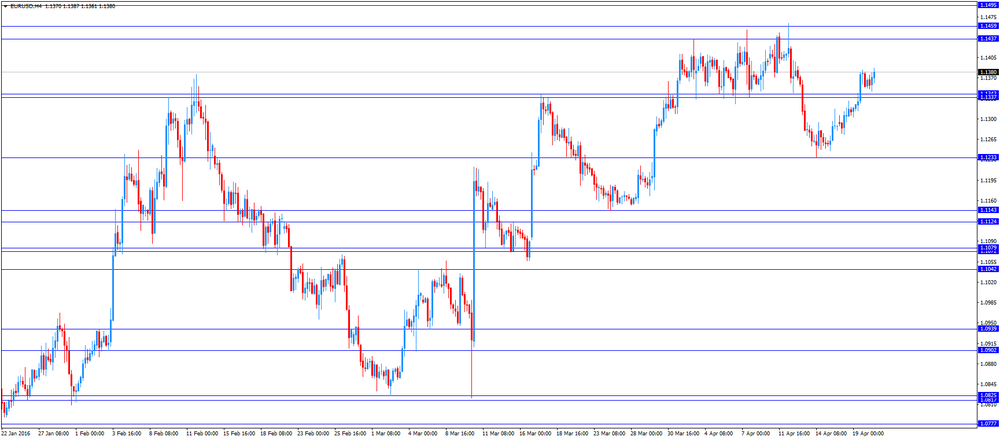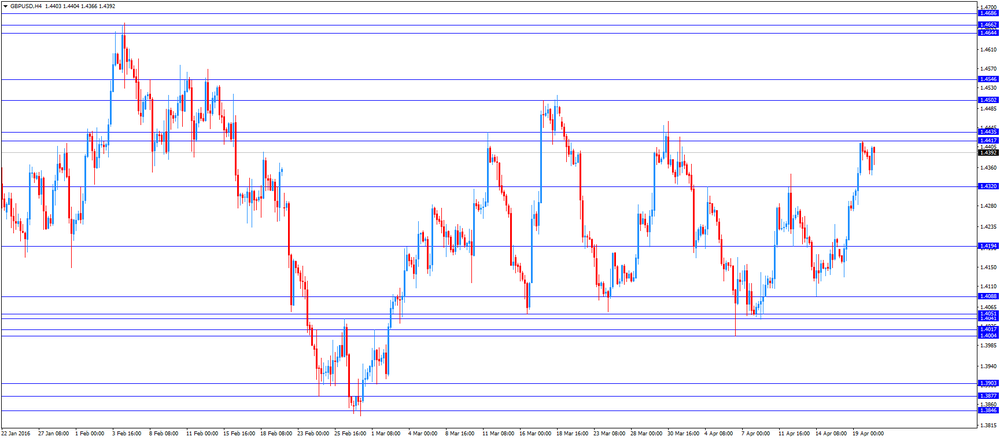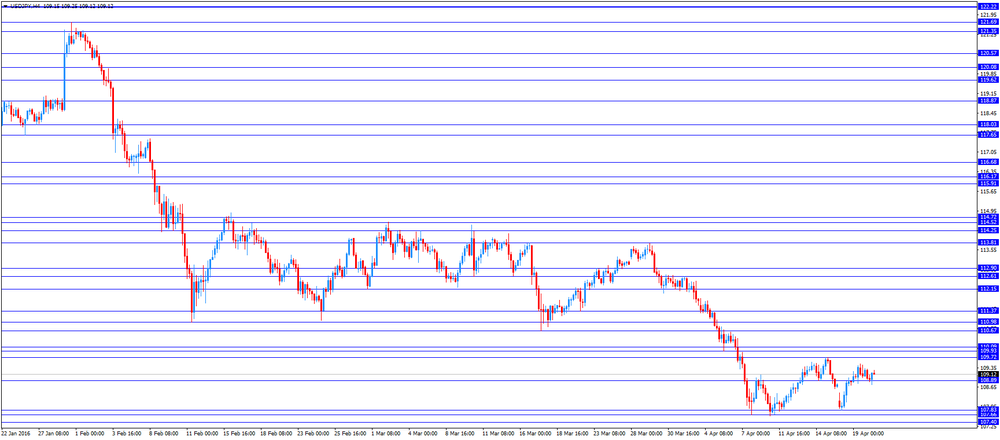- Analytics
- News and Tools
- Market News
- Foreign exchange market. European session: the British pound traded higher against the U.S. dollar despite the weak labour market data from the U.K.
Foreign exchange market. European session: the British pound traded higher against the U.S. dollar despite the weak labour market data from the U.K.
Economic calendar (GMT0):
(Time/ Region/ Event/ Period/ Previous/ Forecast/ Actual)
06:00 Germany Producer Price Index (MoM) March -0.5% 0.2% 0.0%
06:00 Germany Producer Price Index (YoY) March -3.0% -2.9% -3.1%
08:30 United Kingdom Average Earnings, 3m/y February 2.1% 2.3% 1.8%
08:30 United Kingdom Claimant count March -9.3 Revised From -18 -11.3 6.7
08:30 United Kingdom ILO Unemployment Rate February 5.1% 5.1% 5.1%
09:00 Switzerland Credit Suisse ZEW Survey (Expectations) April 2.5 2.5 11.5
10:00 Eurozone ECB President Mario Draghi Speaks
11:00 U.S. MBA Mortgage Applications April 10% 1.3%
The U.S. dollar traded mixed against the most major currencies ahead of the release of the U.S. economic data. The existing home sales in the U.S. are expected to rise to 5.30 million units in March from 5.08 million units in January.
The euro traded higher against the U.S. dollar despite the negative economic data from Germany. Destatis released its producer price index (PPI) for Germany on Wednesday. German PPI producer prices were flat in March, missing expectations for a 0.2% rise, after a 0.5% drop in February.
On a yearly basis, German PPI dropped 3.1% in March, missing expectations for a 2.9% decrease, after a 3.0% fall in February. It was the biggest drop since January 2010.
PPI excluding energy sector fell by 0.9% year-on-year in March. Energy prices were down 9.2% year-on-year in March.
The British pound traded higher against the U.S. dollar despite the weak labour market data from the U.K. The Office for National Statistics (ONS) released its labour market data on Wednesday. The U.K. unemployment rate remained unchanged at 5.1% in the December to February quarter, in line with expectations.
The claimant count rose by 6,700 people in March, missing expectations for a fall by 11,300, after a decrease of 9,300 people in February. February's figure was revised down from a 18,000 decrease.
U.K. unemployment in the November to January period increased by 21,000 to 1.7 million from the previous quarter. It was the first rise since the May-July quarter of 2015.
The employment rate remained unchanged at 74.1% in the December to February quarter. It was the highest reading since 1971.
Average weekly earnings, excluding bonuses, climbed by 2.2% in the December to February quarter, after a 2.2% gain in the November to January quarter.
Average weekly earnings, including bonuses, rose by 1.8% in the December to February quarter, in missing expectations for a 2.3% gain, after a 2.1% increase in the November to January quarter.
The Canadian dollar traded higher against the U.S. dollar ahead of the release of the Canadian economic data. Wholesales sales in Canada are expected to decrease 0.3% in February, after a flat reading in January.
The Swiss franc traded higher against the U.S. dollar. A survey by the ZEW Institute and Credit Suisse Group showed on Wednesday that Switzerland's economic sentiment index climbed to 11.5 in April from 2.5 in March. Analysts had expected the index to remain unchanged at 2.5.
"In regard to economic expectations as well as the current economic situation in Switzerland, the large majority of respondents do not expect to see any changes," the ZEW said.
EUR/USD: the currency pair rose to $1.1387
GBP/USD: the currency pair increased to $1.4406
USD/JPY: the currency pair climbed to Y109.25
The most important news that are expected (GMT0):
12:30 Canada Wholesale Sales, m/m February 0.0% -0.3%
12:30 U.S. Chicago Federal National Activity Index March -0.29
13:00 United Kingdom MPC Member McCafferty Speaks
14:00 U.S. Existing Home Sales March 5.08 5.3
14:30 U.S. Crude Oil Inventories April 6.634 2.5
20:15 Canada BOC Gov Stephen Poloz Speaks
© 2000-2026. All rights reserved.
This site is managed by Teletrade D.J. LLC 2351 LLC 2022 (Euro House, Richmond Hill Road, Kingstown, VC0100, St. Vincent and the Grenadines).
The information on this website is for informational purposes only and does not constitute any investment advice.
The company does not serve or provide services to customers who are residents of the US, Canada, Iran, The Democratic People's Republic of Korea, Yemen and FATF blacklisted countries.
Making transactions on financial markets with marginal financial instruments opens up wide possibilities and allows investors who are willing to take risks to earn high profits, carrying a potentially high risk of losses at the same time. Therefore you should responsibly approach the issue of choosing the appropriate investment strategy, taking the available resources into account, before starting trading.
Use of the information: full or partial use of materials from this website must always be referenced to TeleTrade as the source of information. Use of the materials on the Internet must be accompanied by a hyperlink to teletrade.org. Automatic import of materials and information from this website is prohibited.
Please contact our PR department if you have any questions or need assistance at pr@teletrade.global.


















